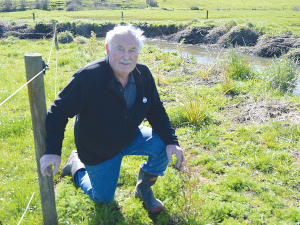Battle for milk
OPINION: Fonterra may be on the verge of selling its consumer business in New Zealand, but the co-operative is not keen on giving any ground to its competitors in the country.
 Farmer John van Heuven says it’s all about leaving the land in a better condition for future generations.
Farmer John van Heuven says it’s all about leaving the land in a better condition for future generations.
Waikato farmers John and Maria van Heuven believe in leaving their 164ha property in a better condition than when they bought it 20 years ago.
Hence the Matamata dairy farmers of 50 years quickly joined the Bridge to Bridge project (B2B), backed by Waikato Regional Council and Fonterra.
The three-year community-run project was completed recently with eight kilometres of Waitoa River fenced and 17,000 native plants and trees in the ground.
The project involved landowners on either side of the Puketutu and Station Road bridges near Matamata, removing pest plants, relocating fencing from the river's edge to create biggr riparian margins and planting native plants and trees.
The Van Heuvens says they are thrilled with the work that has been done on their farm.
"It's fantastic seeing the previous year's plantings coming up now. I can't wait to see what it will look like in 10 or so years."
The project started after some landowners approached the council and Fonterra for support.
John Van Heuven, whose farm on the river flat and flood-prone, says WRC officials visited each property and recommended suitable trees and plants.
The van Heuven family farm has planted all natives - ribbonwood, lemonwood, cabbage trees, manuka, kanuka and even kahikatea and totara.
For some farmers the project took a few hectares of land off the farm but van Heuven says it's worth it.
"Hey, this is the future, we are thinking about the environment," he told Dairy News.
"We are doing it for the sake of our children and grandchildren.
"We are leaving the land in a better condition for them than what we started with."
He says the project has been a team effort and praised WRC and Fonterra for their contributions.
"We weren't expecting a contribution from Fonterra but they had some money available for planting and then the regional council got on board; they were happy to help us out," he says.
WRC catchment management officer Amy Tsao says all the landowners were keen to work with them.
"It's so rewarding to see the progress that's been made."
The project wrapped up with a final planting day involving staff from both Fonterra and WRC infill planting a further 200 trees and doing some weeding to release young plants put in the ground from previous years.
Fonerra's local government and stakeholder affairs manager Philippa Fourie says it's always a good day when staff get to go out in the field and help landowners with planting.
The Fonterra staff members were part of the Matamata-Piako Committee, which oversees Fonterra's support to local community projects under its new Hapori programme.
"We're proud of the commitment shown by the farmers involved in this project," says Fourie.
"Our Sustainable Catchments initiative is all about achieving sustainable water catchments where we operate, and we know that by working with others we can achieve more when it comes to protecting and regenerating waterways and biodiversity."
WRC Hauraki catchment team leader Aniwa Tawa says effort that has been put into the project by everyone had just been awesome.
"All that is required to be done now is some ongoing maintenance by the landowners to keep the young plants free of weeds so they can flourish and grow to be big and strong."
The World Wide Sires National All Day Breeds Best Youth Camp Best All Rounder plaudit has become family affair, with 2026 Paramount Cup winner Holly Williams following in her sister Zara's footsteps.
DairyNZ is giving New Zealand farmers a unique opportunity to gain hands-on governance and leadership experience within the dairy sector.
Herd improvement company LIC has posted a 5.2% lift in half-year revenue, thanks to increasing demand for genetics.
According to the latest Fresh Produce Trend Report from United Fresh, 2026 will be a year where fruit and vegetables are shaped by cost pressures, rapid digital adoption, and a renewed focus on wellbeing at home.
The Roar is a highlight of the game hunting calendar in New Zealand, with thousands of hunters set to head for the hills to hunt male stags during March and April.
OPINION: The past few weeks have been tough on farms across the North Island: floods and storms have caused damage and disruption to families and businesses.